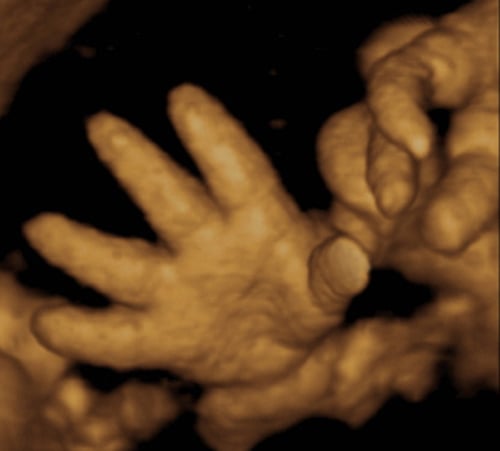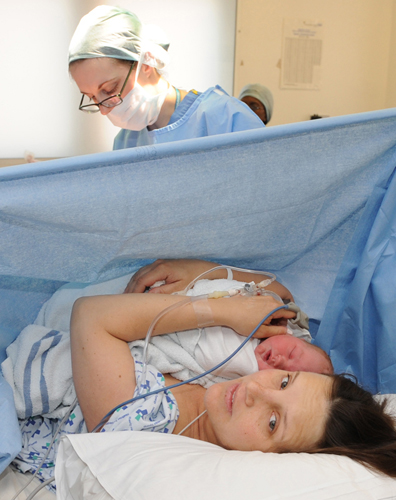You are 39 Weeks and 5 Days 2 days to go…
You’ll be in labor very soon and it’s normal to be anxious about what you need to go through to meet your baby.
Your baby today
This great image of the hands even shows the fine folds that
have formed in the palms. Every baby has a unique pattern of folds on
the palms and on the soles of the feet that you’ll see when your baby
finally arrives.

The final details
of your baby’s appearance—including eyebrows, eyelashes, and nails—are
now in place and all her internal organs are sufficiently developed for
life outside the uterus.

You’re bound to have mixed emotions about going into labor.
While you’ll want your baby to be born, you may be apprehensive about
going through childbirth. Most women are understandably concerned about
the pain, and may worry about their health and that of the baby.
Remember that the majority of deliveries are normal and without
complications and the majority of babies are fit and healthy.
Even though you’ve spent
the past nine months preparing for the birth, you may still feel that
you’re not ready for the baby and that you won’t be able to manage. Some
of this will be the fear of the unknown—you have not yet met your baby
and it’s impossible to predict what the labor—and the weeks that follow
it—will be like.
Although you may not
feel fully prepared, be confident that you’ll know how to take care of
your newborn. In fact, you’ll have probably already started the process
of becoming a mother, wanting to nurture and protect your baby even
before she’s born, and this natural instinct will continue.
… Doctor
| Q: |
What’s the difference between an emergency and elective cesarean?
|
| A: |
An elective cesarean is when a planned decision is made during
pregnancy to deliver the baby by cesarean section before the onset of
labor. This is usually decided upon for medical reasons, although some
women may decide to have an elective cesarean for practical reasons or
to avoid having to go through labor.
An emergency
cesarean is when a situation arises, usually in labor, that means the
safest route for delivery is by cesarean section.
|

MRSA: is it a risk?
There’s a great deal of media coverage of “superbugs,”
such as MRSA. This is a bacterium that can live harmlessly on the skin
of healthy people, but can lead to infection in vulnerable individuals.
Good hygiene, particularly in the form of precautions such as
hand-washing, is an effective method in the prevention of MRSA and your
chances of acquiring the infection in hospital are low.
If cutlery and plates
are washed using detergent and hot water this removes MRSA, and the risk
of acquiring MRSA through contact with curtains, sheets, and pillows is
very low. Health-care workers use antiseptic solutions, such as alcohol
hand rubs, and more recently many hospitals are taking steps to prevent
transmission of MRSA.
In addition to general
hygiene measures, hospitals prevent the spread of MRSA by treating
those infected with antibiotics, and by detecting cases early so that
they can isolate affected patients. Infected patients are moved to a
private room or to a room with others who have MRSA.
You are 39 Weeks and 6 Days 1 day to go…
Your newborn’s stomach will be fully developed, but low acid levels mean she can only be fed milk for the first few months.
Your baby today
It’s been wonderful to see your baby’s progress and facial
features as each day of the pregnancy has passed by. 2D and 3D
ultrasound images, as well as MRI, have all played a part in giving us a
glimpse into the fascinating and complex world of life before birth.

Unlike an adult, your baby produces
little gastric acid and keeps amniotic fluid in the stomach longer; it
is this fluid that helps keep the acid content of her stomach low. While
your baby is in the uterus hiccupping, turning upside down, and trying
to coordinate breathing with swallowing, not having much hydrochloric
acid in the stomach is a good idea.
After birth the acid
content of your baby’s stomach will increase quickly in the first 24
hours but not reach adult levels until three months. This is why solids
aren’t introduced until a baby is at least four months old, although six
months is the current advice on when to start weaning. Babies have a
reflex to spit out solid food if it’s introduced too early and will only
be able to take about 20–25 ml of food before the stomach is full. So
it’s easy to see how the stomach can quickly be overloaded, resulting in
spitting up, which is when the baby brings the food and some milk back
up.
Raspberry leaf tea
Raspberry leaf tea is a traditional remedy in Europe.
European studies have found that drinking this tea in the months prior
to delivery (not before week 30) helps shorten the second stage of labor
by helping the uterine muscles to contract more efficiently, so that
contractions are more effective.
The tea is also said to reduce the risk of having an assisted delivery, such as emergency cesarean or vacuum.
In addition to
this, raspberry leaf tea is believed to help the uterus to contract back
to its normal size after the birth, and encourage the flow of breast
milk.
As always you should talk to your doctor, before drinking any herbal teas or taking any kind of herbal remedies.

… Doctor
| Q: |
What exactly is a “bloody show”?
|
| A: |
During pregnancy, a plug of jellylike mucus seals the lower
end of your cervix and this prevents infection from getting into your
uterus .
This “plug” comes away toward the end of pregnancy—known as a “bloody
show”—and although this can mean that labor is going to start soon, it
can also dislodge up to six weeks before your labor actually starts.
|
Take a break
Getting to know your newborn
can be difficult if there’s a constant stream of visitors bearing gifts
and good wishes. Why not shut out the world and spend a few days home
alone? Your newborn baby will sleep a lot, so take the opportunity to do
the same. There will be plenty of time for people to meet the new
member of your family.
Your hormones will be
all over the place, so expect to experience lows as well as highs,
especially when your milk comes in .
Your partner also needs time to bond with his baby, nurture you both, and come to grips with diaper changing.
So stick a message on the front door, switch on the answering machine, and snuggle up with your new family.